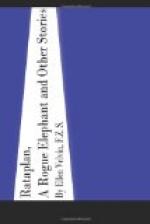And so it happened one evening that, as he made his way towards the village—making up his mind that if there was nothing else he must have a sheep—he suddenly came across the dead body of a little Kaffir boy lying by the wayside.
The Kaffirs very seldom bury their dead, and so the mother had laid her beloved one under a shady bank, and left him with a few leaves strewn over him.
At first Leo hesitated. He had never tasted Kaffir, and he also knew that it was a bad thing to eat. But he was very hungry himself, and his wife and family were hungry, too; and the little Kaffir boy would be light to carry.
After smelling and turning over the body, he decided first to taste it and see whether it would be good for his family to eat.
Alas! once having tasted it, Leo was done for. It was the most delicious food he had ever tasted, and he was unable to stop eating until he had made a full, heavy meal. Then he looked at the poor little carcass; there would still be enough for the cubs, and yet he hesitated.
He knew it would be bad for them; he knew that, once having given it to them, they would be spoilt for all other food; but he had eaten so heartily himself, and was already getting so lazy and sleepy from the effects of his meal, that he had no energy nor inclination to hunt for any other food that night. So, taking the remains of the little Kaffir boy in his strong mouth, he trotted swiftly off to his lair, and put it down temptingly in front of the cubs.
There were two of them, and they were ravenously hungry; without more ado they set to work, and tore and crunched with their sharp teeth and strong little jaws, until there was not a vestige of the little Kaffir boy left.
The lioness, seeing there was only sufficient food for the cubs, did not attempt to take any, but, hungry as she was, looked placidly on while the young ones satisfied their hunger.
[Illustration: “HE WOULD TAKE UP SOME SMALL ANIMAL AND WALK COOLLY OFF WITH IT.”]
Leo looked at her guiltily, and expected reproaches. But, as it happened, his wife had not noticed what kind of food he had brought; it had been too much torn to be recognizable, and she concluded it was the remains of some small animal he had killed.
At any other time he would have gone out again to fetch some food for his wife, but he was so heavy and sleepy that, with one big yawn, he sank down, stretched out his huge paws in front of him, and, nestling his handsome head comfortably between them, sank into a deep sleep.
From that day Leo was no longer the same. He was restless and irritable, snappy and fierce even to his wife and children. He raced no more after buffaloes or giraffes, or even for antelopes or jaguars; all he wanted was human flesh.
Once having tasted it, he cared for and could eat no other. And as time went on his magnificent coat began to come off in great, unsightly patches, his eyes and mouth got sore and red, and his limbs grew weak and rickety. His roar was no longer the fierce, grand, triumphant roar that it had been; it resembled a hoarse cry of pain now, and his little ones—instead of being sturdy little cubs as they had been—had grown thin, miserable, and mangy.




